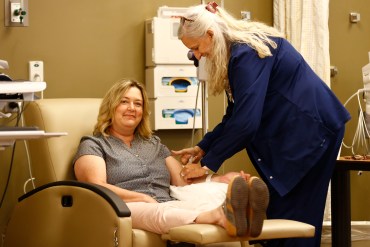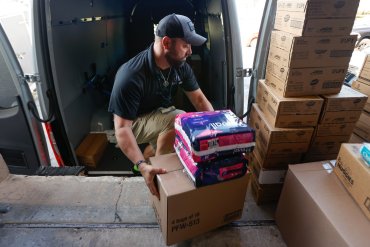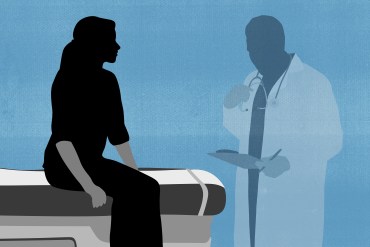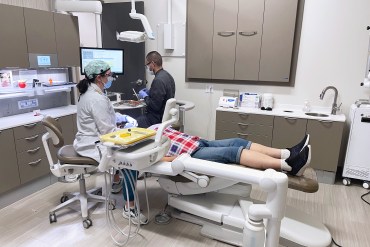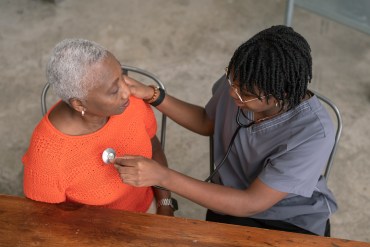Proposed PFAS Rule Would Cost Companies Estimated $1B; Lacks Limits and Cleanup Requirement
A proposed Environmental Protection Agency rule calls for companies to disclose PFAS manufactured or imported since 2011. The chemical industry is upset because such compliance would cost an estimated $1 billion, while environmental health advocates worry because the rule wouldn’t ban the chemicals outright.
Patients Squeezed in Fight Over Who Gets to Bill for Pricey Infusion Drugs
To drive down costs, insurers are bypassing hospital system pharmacies and delivering high-priced infusion drugs, including some used in chemotherapy, via third-party pharmacies. Smarting from losing out on billing for those drugs, hospitals and clinics are trying to convince states to limit this practice, known as “white bagging.”
More States Legalize Sales of Unpasteurized Milk, Despite Public Health Warnings
Distrust of public health authorities, who say drinking raw milk is dangerous, fuels demand for unpasteurized milk products, leaders on both sides of the issue say.
As Low-Nicotine Cigarettes Hit the Market, Anti-Smoking Groups Press for Wider Standard
The first FDA-authorized cigarettes with 95% less nicotine than traditional smokes will go on sale in California, Florida, and Texas starting in early July. Anti-smoking groups oppose greenlighting just one plant biotech’s products and instead urge federal regulators to set a low-nicotine standard for the entire industry.
More States Drop Sales Tax on Disposable Diapers to Boost Affordability
Last month, Florida joined a growing number of states in banning sales taxes on diapers to make them more affordable for older adults and families with young children. Though diapers are essential for many, they are not covered by food stamps. Nor are incontinence products for older adults typically covered by Medicare. The cost can easily add up on a fixed income.
Will the Doctor See You Now? The Health System’s Changing Landscape
The “front door” to the health system is changing, under pressure from increased demand, consolidation, and changing patient expectations.
The DEA Relaxed Online Prescribing Rules During Covid. Now It Wants to Rein Them In.
Supporters say the proposed rules would balance the goals of increasing access to health care and helping prevent medication misuse. Opponents say the rules would make it difficult for some patients — especially those in rural areas — to get care.
Malpractice Lawsuits Over Denied Abortion Care May Be on the Horizon
Physicians and attorneys say it’s a question of when — not if — a pregnant person dies from lack of care in a state with an abortion ban, potentially setting the stage for a malpractice lawsuit that could pressure providers to reconsider delaying or denying care.
Black, Rural Southern Women at Gravest Risk From Pregnancy Miss Out on Maternal Health Aid
A federal program meant to reduce maternal and infant mortality in rural areas isn’t reaching Black women who are most likely to die from pregnancy-related causes.
Medical Exiles: Families Flee States Amid Crackdown on Transgender Care
As more states restrict gender-affirming care for transgender people, some are relocating to more welcoming destinations, such as California, Illinois, Maryland, and Nevada, where they don’t have to worry about being locked out of medical care.
Opioid Settlement Payouts to Localities Made Public for First Time
KFF Health News obtained documents showing the exact dollar amounts — down to the cent — that local governments have been allocated in 2022 and 2023 to battle the ongoing opioid crisis.
What One Hospital’s Slow Recovery From a Cyberattack Means for Patients
U.S. hospitals have seen a record number of cyberattacks over the past few years. Getting hacked can cost a hospital millions of dollars, expose patient data, and even jeopardize patient care.
Biden Admin Implores States to Slow Medicaid Cuts After More Than 1M Enrollees Dropped
Secretary of Health and Human Services Xavier Becerra is asking states to make more of an effort to keep eligible Medicaid recipients enrolled. He particularly fears children losing health insurance coverage.
Chronic Lifeguard Shortage Serves as Springboard to Address Racial Inequities
Cities and towns are again in deep waters this summer trying to hire enough lifeguards to open their public pools. Many are proceeding with sensitivity to issues of race and ethnicity.
Dental Therapists Help Patients in Need of Care Avoid the Brush-Off
Dental therapists are licensed providers who offer basic care traditionally provided by dentists, including fillings and simple tooth extractions. But opposition from interest groups and the profession’s relative newness mean more than two-thirds of states don’t yet have them.
As Fewer MDs Practice Rural Primary Care, a Different Type of Doctor Helps Take Up the Slack
The number of DOs is surging, and more than half of them practice in primary care, including in rural areas hit hard by doctor shortages.
As Medicaid Purge Begins, ‘Staggering Numbers’ of Americans Lose Coverage
In what’s known as the Medicaid “unwinding,” states are combing through rolls to decide who stays and who goes. But the overwhelming majority of people who have lost coverage so far were dropped because of technicalities, not because officials determined they are no longer eligible.
More States OK Postpartum Medicaid Coverage Beyond Two Months
Montana, Alaska, Mississippi, Missouri, South Dakota, Texas, Utah, and Wyoming are among the latest states moving to provide health coverage for up to a year after pregnancy through the federal-state health insurance program for low-income people.
How a Medical Recoding May Limit Cancer Patients’ Options for Breast Reconstruction
The federal government’s arcane process for medical coding is influencing which reconstructive surgery options are available, creating anxiety for breast cancer patients.
Cardiovascular Disease Is Primed to Kill More Older Adults, Especially Blacks and Hispanics
Cardiovascular disease is the biggest killer of older Americans, with Black and Hispanic people at higher risk. Despite medical advances, researchers say, disparities are expected to worsen in the coming decades.





